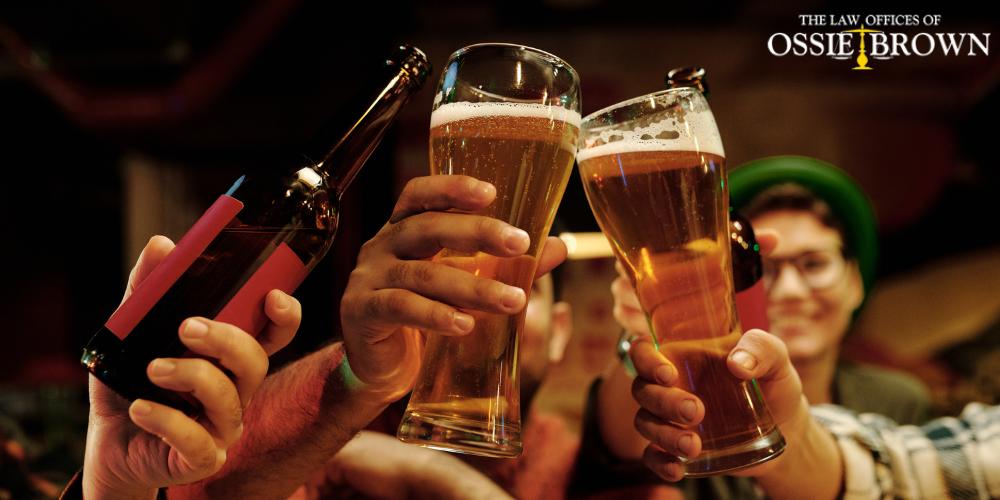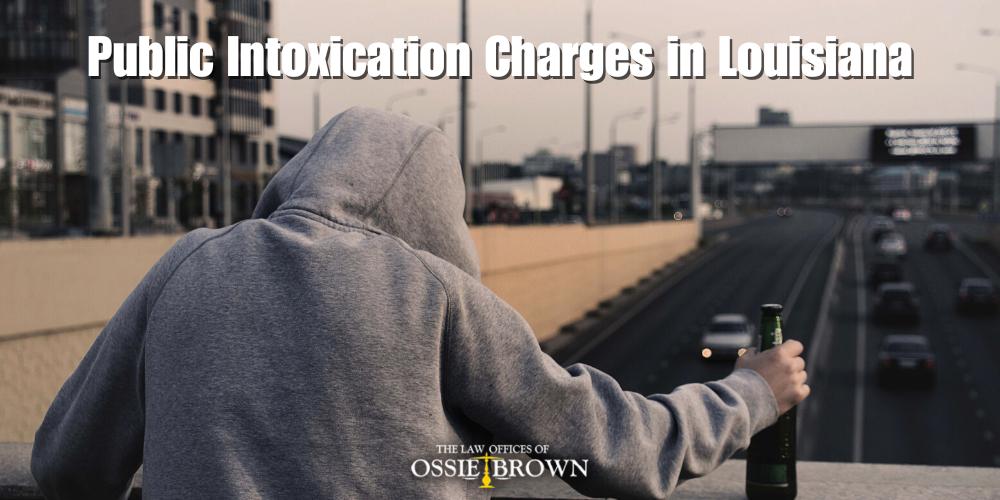There aren’t any specific public intoxication law under Louisiana’s liquor laws. Instead, Louisiana laws for “disorderly conduct” or “disturbing the peace” are where public drunkenness falls. This is the case in Louisiana. Our local laws state that committing drunk and disorderly conduct in a public place is a form of disturbing the peace and, therefore, can result in criminal charges and penalties. Below, our Baton Rouge criminal defense lawyers break down everything you need to know about the crime of public intoxication so that you can stay on the right side of the law the next time you go out and party.
If you’re facing any kind of alcohol-related criminal charges or violation of Louisiana liquor laws, it’s important to hire an experienced criminal defense lawyer. Public drunkenness and DUI convictions can easily affect your ability to get a job, rent an apartment, and even apply for a loan. Allow a Baton Rouge DUI attorney to defend your legal rights and help you obtain the best possible case outcome. Call 225-343-1111 to schedule a free consultation at the Law Offices of Ossie Brown Today.
What is Public Intoxication in Louisiana?
In most states, public intoxication means getting high or drunk in public, disturbing other people, and/or engaging in behaviors that puts people in imminent danger.
In Louisiana, public intoxication technically falls under a law called “disturbing the peace” or disorderly conduct (RS 14:103). Not only does public intoxication fall under this state law, but so does the following:
- Fighting or acting violent with three or more people in public spaces,
- Disturbing people in public who are acting lawfully by using offensive language,
- Interrupting a lawful assembly in public,
- Creating an unlawful assembly in public,
- Purposely disrupting a funeral, funeral route, viewing, burial, or memorial service using offensive language or disruptive behavior.
If Louisiana law enforcement officers catch you disturbing the peace in public, you can face criminal charges and penalties.
Contact a disorderly conduct lawyer in Baton Rouge to learn more.
Elements of a Public Intoxication Charge in Louisiana
Following an arrest for public intoxication, states and local jurisdictions must effectively prove public intoxication in order to charge the person with misdemeanor or felony offenses. Generally, local jurisdictions have to prove the following three elements occurred beyond a reasonable doubt:
- The person was under the influence of intoxicating liquor, controlled substances, and/or drugs;
- The person caused a disturbance or behaved in a way that violated his or her own safety or the safety of others;
- And the person was in a public place.
Under the Influence
The first element of public intoxication law that must be proven is intoxication, which means that someone does not have the normal use of mental or physical faculties due to the consumption of alcohol, drugs, or a controlled substance. Depending on the city or state law, though, proving regular intoxication may not be enough for a public intoxication charge. So, in many cases, it must be proven that the intoxicated person was clearly out of control to the point where they could not exercise care for themselves or others.
For example, an intoxicated person who walks out of a bar quietly and calmly and then waits for an Uber without disturbing anyone would likely not face an arrest or public intoxication charge. On the other hand, an intoxicated person who stumbles out of a bar, loudly throws slurred insults to nearby pedestrians, and wanders into a busy street would likely be arrested for violating public intoxication laws.
Causing a Disturbance
The main element of a public intoxication charge is causing a disturbance. Plenty of people go out to have an alcoholic beverage at a bar without bothering other people or becoming a safety hazard. But those who get high or drunk in public and then disturb others, create a dangerous situation, or commit some other crime are in clear violation of public intoxication laws.

Presence in a Public Place
Being in a public place is another key component to a public intoxication charge. Believe it or not, not every city or state law actually defines what a “public place” means. So if someone got drunk or high in their motor vehicle that was parked on a public street or parking lot, many states would struggle to define whether this person was intoxicated in public or not. Technically though, a car parked on a public street or parking lot is not considered a “private place.”
This is one of many reasons why it’s important for those facing public intoxication charges to hire an experienced criminal defense lawyer. Law enforcement officers may originally state that you got drunk in public, but did you really? An attorney can analyze the details of your case and help define what a public place actually is.
Penalties for Public Intoxication in Louisiana
Louisiana doesn’t have classes of misdemeanors (Class B misdemeanor or Class C misdemeanor, for example), so a public drunkenness is considered just a misdemeanor crime.
Exact penalties will depend on how exactly you “disturbed the peace.” Public drunkenness often results in the most minor penalties, including a $100 fine and/or 90 days of jail time. However, those who disturb the peace by purposely disrupting a funeral or funeral route will face a $500 fine and/or 6 months of jail time.
Publicly intoxicated people who endanger themselves or others or cause bodily harm to themselves or others (often referred to as aggravated public intoxication) may face more severe penalties depending on the specific circumstances.
Possible Defenses to a Public Intoxication Charge
It is very possible to beat public intoxication charges or reduce the penalties, especially with an experienced criminal defense lawyer on your side. The legal team at the Law Offices of Ossie Brown can analyze the details of your case and develop a strong defense. Below, we break down some of the most common defenses to drunk and disorderly conduct in public.
The Offender Wasn’t Intoxicated or They Weren’t Voluntarily Intoxicated
Just because a person appears intoxicated, doesn’t mean they necessarily are. People can act rowdy in public spaces for other reasons too, such as excitement over sports games or some other event.
Additionally, it’s difficult to prove that someone was actually intoxicated in court without any type of testing conducted by police, and it’s even more difficult to prove if someone were to refuse a breathalyzer test. Without solid proof of intoxication, a Baton Rouge criminal defense lawyer could fight to drop the charges or have the penalties reduced.
We provide more information here: can you refuse a breathalyzer in Louisiana?
It’s also important to consider involuntarily public intoxication, which means that the intoxicated person unknowingly consumed a drug or controlled substance, which led to their disordered conduct. For example, maybe a woman goes on a date with a stranger. At some point during the date, the stranger slips the date rape drug, Rohypnol, into the woman’s drink. Despite only having one drink, she becomes incredibly intoxicated, escapes the stranger, and eventually passes out in a public place. In this situation, the woman’s public intoxication was not her fault, and therefore, she should not face any repercussions.
The Offender Wasn’t Causing a Disturbance
The exact definition of what’s considered “disturbing the peace” can be up for debate in certain cases. Louisiana’s “disturbing the peace” law offers many examples of what’s considered disruptive or disturbing behavior, one of them being “appearing in an intoxicated condition.” But this description could be open to interpretation, depending on who you ask.
Firstly, someone who “appears intoxicated” may not actually be intoxicated at all, as previously explained. Even if they were clearly drunk in public (i.e. slurring or stumbling), should they still face public intoxication charges if they weren’t bothering anyone, committing a crime, or endangering themselves or others?
Baton Rouge disturbing the peace lawyer group can potentially use this defense in your favor in order to have your charges dropped or your penalties reduced.
The Offender Was in a Private Place
As previously explained, the “public place” element of a public intoxication charge can be debatable, depending on the state’s laws. Some public intoxication laws, such as Louisiana’s, don’t explicitly define what is considered a public place and what isn’t. It goes without saying that some spaces are clearly public, but still, there are many gray areas here.
For example, are hotel hallways considered public? Are shared parking lots in private apartment complexes considered public? Is a neighborhood street right in front of the drunk person’s house considered public?
Often, it takes a skilled drunk in public lawyer in Baton Rouge to define which locations are public or private. The distinction could result in dropped charges or reduced penalties.

Baton Rouge Public Intoxication Defense Lawyers
If you are facing a public intoxication charge, a violation of Louisiana open container laws, or a DUI charge in Louisiana, it’s important to arm yourself with aggressive legal representation. Alcohol-related criminal offenses can result in major penalties and a permanently tainted criminal record, which can affect the rest of your life. Baton Rouge criminal defense lawyers at the Law Offices of Ossie Brown can fight for your legal rights and help you obtain a reduced charge or penalty. Call 225-343-1111 to schedule a free consultation at our law firm today.


